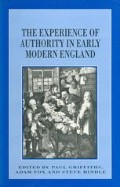Abstract
These essays are about social relationships in early modern England. They are concerned with the articulation, mediation and reception of authority; with the preoccupations and aspirations of both governors and governed in English society between the sixteenth and eighteenth centuries. From various perspectives, contributions explore the ongoing set of negotiations between dominant ideologies, groups or individuals, and those subordinate to them, which constitute the exercise of power.
Preview
Unable to display preview. Download preview PDF.
Notes and References
P. Collinson, De Republica Anglorum: Or, History with the Politics Put Back (Cambridge, 1990).
See esp. K. Wrightson, ‘The Enclosure of English Social Historyn’, Social History, 1 (1990), pp. 73–81; revised and reprinted in
A. Wilson (ed.), Rethinking Social History: English Society 1570–1920 and its Interpretation (Manchester, 1993), pp. 59–77; and Chapter 1 below.
Georg Simmel writes that all ‘power relations involve an active reciprocity of orientation’, extracts from his writings reprinted in L. A. Coser and B. Rosenberg (eds), Sociological Theory: A Book of Readings, 2nd edn (New York, 1964), p. 123.
M. Mann, The Sources of Social Power, Volume I: A History of Power from the Beginning to AD 1760 (Cambridge, 1986), pp. 7–8.
See esp. J. C. Scott, Domination and the Arts of Resistance: Hidden Transcripts (New Haven, 1990);
E. P. Thompson, Customs in Common (London, 1991).
E. P. Thompson, The Making of the English Working Class (Harmonds-worth, 1968), p. 12; and The Poverty of Theory and Other Essays (London, 1978), chs 1, 3.
H. Sewell, ‘How Classes Are Made: Critical Reflections on E. P. Thompson’s Theory of Working-class Formation’, in H. J. Kaye and K. McClelland (eds), E. P. Thompson: Critical Perspectives (Cambridge, 1990), pp. 50–78, esp. pp. 59–66; D. Cannadine, ‘The Way We Lived Then’, Times Literary Supplement, 7–13 September (1990), pp. 935–6.
G. Strauss, ‘The Dilemma of Popular History’, Past and Present, vol. 132 (1991), pp. 130–49, esp. pp. 133–4. Cf.
W. Beik, ‘Debate: The Dilemma of Popular History’, Past and Present, vol. 141 (1993), pp. 207–19.
Editor information
Copyright information
© 1996 Paul Griffiths, Adam Fox and Steve Hindle
About this chapter
Cite this chapter
Griffiths, P., Fox, A., Hindle, S. (1996). Introduction. In: Griffiths, P., Fox, A., Hindle, S. (eds) The Experience of Authority in Early Modern England. Themes in Focus. Palgrave, London. https://doi.org/10.1007/978-1-349-24834-6_1
Download citation
DOI: https://doi.org/10.1007/978-1-349-24834-6_1
Publisher Name: Palgrave, London
Print ISBN: 978-0-333-59884-9
Online ISBN: 978-1-349-24834-6
eBook Packages: Palgrave History CollectionHistory (R0)

